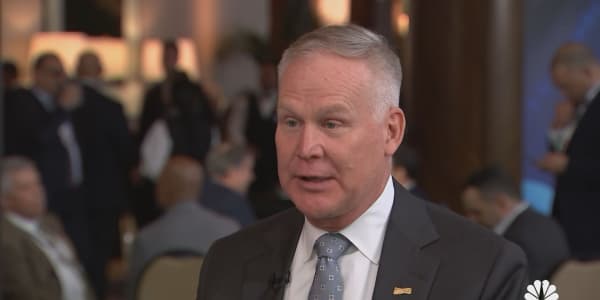The sanctioning of two OPEC members by the Trump administration has caused some ripples in the oil market, but not the type of shortages or pain for consumers that might have occurred.
One big reason is that U.S. production continues to grow, and for the barrels lost, more are coming on line. U.S. output is now at 12.1 million barrels a day, up more than 1 million from this time last year, and IHS Markit expects it to be 13 million by the end of the year.
That has given the United States more muscle and flexibility when it comes to sanctions.
Saudi Arabia, OPEC and Russia initially agreed last spring to add more oil to the market to make up for limited Iranian output, but even with Iran's exports down by 1.4 million barrels a day, there is no shortage.
The Trump administration surprised the market in the fall by granting some countries waivers to continue with Iranian oil purchases, after threatening that all barrels would be kept from the market. The price of oil then fell sharply after that October announcement, and OPEC and non-OPEC producers have reversed course and are now pulling barrels from the market.
"Trump is yelling at OPEC, but Trump's been the most effective cutter" in barrels on the world market, said Helima Croft, RBC head of global commodities strategy. "He has made sure OPEC's made its quota by sanctioning Iran and Venezuela."
She said 1.6 million barrels a day have been removed from the market, and President Donald Trump could choose to remove even more from Iran's exports when waivers come up for renewal in May.
"Everyone is trying to figure out what's going on with the next round of Iran waivers," Croft said.
India, for instance, is purchasing about 300,000 barrels a day from Iran and is seeking to extend its waiver, according to Reuters.
"Trump was the disruptor in chief in the market. He really was, if you look at where some of the biggest losses were," Croft said.
Both Venezuela and Iran are expected to be big topics of conversation among members of the world oil industry as they gather in Houston this week for IHS Markit's annual CERAWeek conference. Secretary of State Mike Pompeo speaks to the gathering Tuesday.
Elliott Abrams, the State Department Special Representative for Venezuela, said the sanctions on Venezuela are meant to be temporary and force people to change behavior. The U.S. actions are seen as a message aimed at the military leadership, which so far continues to support Venezuela President Nicolas Maduro.
The United States has recognized Juan Guaido, president of the Assembly, who declared himself Venezuela's president six weeks ago.
"The allegation that Juan Guaido is a puppet of the United States is first ridiculous and second has been disproved in a number of ways — one is the number of countries that support him," said Abrams at a press briefing Friday.
Venezuela oil production has been falling sharply on its own to the point where it was expected to be well less than 1 million barrels a day this year. The sanctions on that country have not caused any huge market shocks.
"The extraordinary thing is it's caused some tightness in heavy oil, and that's been reflected but it's not been a market moving event," said Daniel Yergin, IHS Markit vice chairman.
The oil market's response
Yergin said Venezuela's oil operations had been deteriorating so much under Maduro that they had already become much less important to world supply, even though Venezuela has the world's largest oil reserves. "The Maduro regime has been committing oil suicide," said Yergin.
Venezuela exports oil to China and Russia, but those barrels are basically to pay off debts. India remains a major customer, and the U.S. had also used Venezuelan crude.

Analysts see the reduction of heavy barrels as a temporary situation for the U.S. market, which relies on imported heavy crude to feed the Gulf Coast refineries. Saudi Arabia had cut back dramatically on its exports of heavy crude to the U.S. but increased them last week.
"The shortage of heavy crude has made it more expensive, and that has hurt refining margins," said Andrew Lipow, president of Lipow Oil Associates. Lipow said heavy crude is now commanding a price of several dollars more per barrel.
Brazil and Iraq are also expected to put more heavy crude barrels onto the market, and Canada could release more shipments of Alberta crude to the U.S. if prices remain high enough to make it economically feasible. Alberta crude comes into the U.S. by rail.
"The serious question that everyone is looking at is the availability of heavy crude oil as a further round of sanctions on Iran plays out, " said IHS Markit senior vice president Carlos Pascual. As he explains, time will tell which countries will be most significantly affected.
Pascual said there could be an end to the heavier crude shortfall when the global shipping industry switches away from high sulfur fuels, starting Jan. 1.
He also said if Maduro were to leave, there would be no quick fix for Venezuela's energy sector. "It will take years. Part of the challenge is the infrastructure has been cannibalized to repair other infrastructure. ...It's a case of rebuilding or scrapping and building new," said Pascual.
The U.S. produces light sweet crude, so more U.S. oil is going onto the world market. In two separate weeks in the last several months, the U.S. was temporarily a net exporter of crude and refined products, with well more than 3 million U.S. oil barrels hitting the world market.
"I think it's obvious Iranian sanctions, either under Obama or Trump, would not work without the increase of U.S. production," said Yergin. "Although it's not the same grade of oil, it would have been very difficult to do that in the market."
Yergin said he expects the U.S. to become a net exporter on a consistent basis within the next two to three years, something the U.S. has not been since the late 1940s.
"It's [providing] the flexibility on sanctions. It also puts something very big on the table for the U.S.-Chinese trade negotiations," said Yergin,
Yergin said the U.S. industry is now focused on ways to export more oil and expand Texan ports. "This is a dramatic reshaping of global trade flows," he said.





